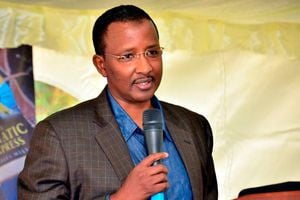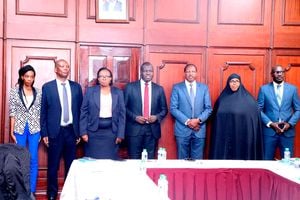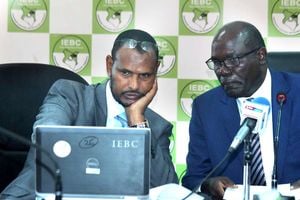
Former IEBC chairman Wafula Chebukati at KICD in Nairobi yesterday when he appeared before the tribunal investigating the conduct of four IEBC commissioners.
Former Independent Electoral and Boundaries Commission (IEBC) Chairman Wafula Chebukati’s attempts to join the judiciary as an Appeal judge has hit a dead end.
The Judicial Service Commission (JSC) did not shortlist him in a communication Tuesday.
Mr Chebukati, along with 82 other applicants, which included lawyers, High Court judges and magistrates, applied for the position.
The JSC had called for applications on February 9, 2024, for 11 vacancies for the position of judge in the Court of Appeal. Out of the 82 applicants, only 41 candidates have been shortlisted for interviews starting on June 3. From these interviews, 11 qualified individuals will be selected for the position.
“The JSC having reviewed the applications for completeness and conformity with requirements as set out in the advertisement, shortlisted 41 candidates,” JSC said in an advert published in local dailies on April 23.
The JSC informed shortlisted candidates that interviews to fill the 11 vacancies will be conducted from June 3 to 20.
However, Mr Chebukati’s predecessor, Hassan Ahmed Issack, who oversaw the 2013 General Elections, has been shortlisted for the position. He will be the first to face the panel conducting the interviews on June 3 at 9 am.
The outcomes of the presidential elections overseen by Mr Chebukati and Mr Issack were both determined by the Supreme Court.
While Mr Issack presided over one presidential election involving opposition leader Raila Odinga and former President Uhuru Kenyatta, whose final verdict was decided by the Supreme Court, Mr Chebukati faced the apex court twice.
The first instance was in 2017 when Supreme Court Judges, led by retired Chief Justice David Maraga at the time. In that election, where Mr Odinga was competing against Mr Kenyatta, the Justice Maraga-led panel annulled the elections and instructed Mr Chebukati to conduct another election due to numerous irregularities observed in the election results that declared Mr Kenyatta as the winner.
Mr Chebukati was also taken back to the Apex court in 2022 after Mr Odinga filed a petition challenging the election of Dr William Ruto as the fifth President of Kenya.
The Supreme Court judges, led by Chief Justice Martha Koome, however, upheld the results as announced by Mr Chebukati.
Senior Counsel Ahmednasir Abdullahi is unhappy with the way the JSC is handling the recruitment process, criticizing its bias towards judges and magistrates.
The lawyer criticised Justice Koome for turning judicial recruitment into an internal process that only benefits judges and magistrates.
“Lawyers in private practice and academics are totally excluded from the process. Out of the 41 candidates shortlisted, only eight are not judges,” lamented Mr Abdulahi on his Twitter handle.
According to the advocate, the CJ does not look at the performance, competence records, and corrupt activities and or records of the judges during the promotion exercise,
The advocate, however, acknowledges that there are very good judges who have been shortlisted, but observes that there are others shortlisted who should have left the judiciary ages ago.
Further, the advocate has advised the JSC to ensure that the Court of Appeal is staffed by competent judges from all Kenyan tribes, rather than being an exclusive club of a few tribes.
“The Court must reflect the face of the country. We need more ethnic minorities in the Court of Appeal, especially from Coast, Northern Kenya, Kuria, Samburu, Turkana, Pokot, and Masaai. That is, a very important reason why this recruitment exercise needs to be cancelled as candidates from these regions have been disqualified during the shortlisting process,” he lamented.
According to the advocate, the JSC must agree before the interview process starts that 40 per cent of the dominated candidates must come from the judiciary, 40 per cent from lawyers in private practice and the remaining 20 per cent from the civil service and faculties of law amongst other sectors.
The advocate has also lamented why Mr Chebukati missed on the list of the shortlisted candidates.
Mr Abdullahi has recently faced challenges with the Judiciary as the Apex court barred him from appearing before it due to his frequent attacks on the judges at the Supreme Court.
The Supreme Court in January banned Mr Abdullahi from ever appearing before it to represent clients for his continued attacks on Judges.








